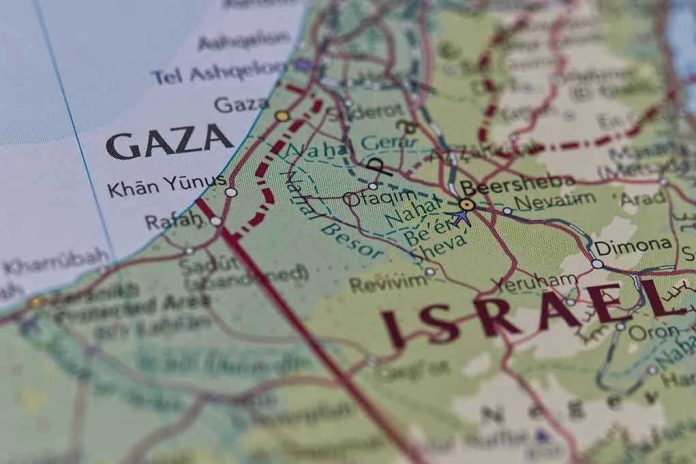
Netanyahu and Trump are advancing a high-stakes proposal to disarm Hamas, which could lead to a significant shift in Gaza’s governance.
Story Highlights
- Netanyahu and Trump propose a ceasefire demanding Hamas disarm and release hostages.
- If Hamas refuses, the US may allow Israel to intensify military operations in Gaza.
- The plan includes a potential US-led international administration in Gaza.
- Over 600 former Israeli security officials urge an end to the conflict.
Netanyahu, Trump Propose Ceasefire Ultimatum to Hamas
Israeli Prime Minister Benjamin Netanyahu and US President Donald Trump are in advanced negotiations over a comprehensive proposal aimed at resolving the ongoing conflict in Gaza. The plan demands Hamas disarm and release all hostages. Failure to comply would allow the Israeli Defense Forces to increase military operations in the region. The proposal also suggests the establishment of a US-led international administration in Gaza if Hamas agrees to the terms.
Hamas, however, has so far rejected disarmament, maintaining its stance on resisting occupation. Netanyahu and Trump’s proposal comes amid escalating international pressure to address the humanitarian crisis in Gaza, which has worsened due to ongoing hostilities and shortages of essential supplies.
Trump’s Continued Influence on Middle East Policy
Though Donald Trump is no longer the sitting president, his involvement in active negotiations highlights his continued influence over US foreign policy. His recent suggestion of a US-led control of Gaza during a visit to Qatar in May 2025 underscores his assertive diplomatic approach. Trump’s actions demonstrate his desire to shape his political legacy by showcasing strong leadership and commitment to global stability.
Over 600 former Israeli security officials have publicly urged Trump to pressure Netanyahu to end the war. This highlights the internal and external pressures both leaders face in resolving the conflict and addressing the humanitarian needs of those affected.
The Role of International Mediators and Envoys
US Special Middle East Envoy Steve Witkoff is currently in Israel to discuss the humanitarian crisis and push for a ceasefire. His involvement is crucial in facilitating dialogue between the parties involved and exploring feasible solutions. Qatari and Egyptian mediators are also playing significant roles, serving as channels for indirect negotiations with Hamas.
Despite these efforts, the path to peace remains fraught with challenges, as Hamas’ steadfast refusal to disarm poses a significant obstacle to achieving a lasting resolution.
Implications and Future Prospects
The potential establishment of a US-led international administration in Gaza, as outlined in the proposal, could fundamentally alter the region’s governance and security dynamics. Such a move would set a new precedent for direct US involvement in post-conflict administration in the Middle East. However, the feasibility and international support for this aspect of the proposal remain uncertain.
If negotiations succeed, the implications could include increased humanitarian aid and investment in Gaza, alleviating some of the ongoing suffering. However, the risk of intensified military action and renewed violence looms if the ultimatum is rejected.







